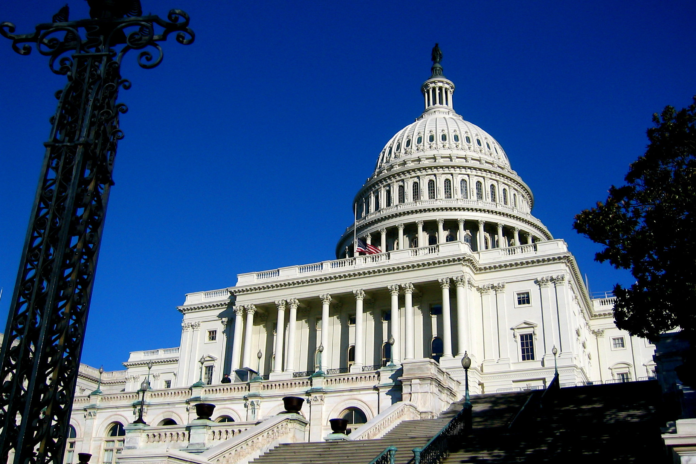Hours before lawmakers voted on a multi-trillion dollar government funding package that included a $900 billion COVID-19 relief bill, congressional aides were spotted wheeling in the legislation.
It ran 5,593 pages.
“You’d have to read 560 pages an hour to finish it before midnight,” observed NBC News correspondent Garrett Haake.
Folks! The bill is on the move! pic.twitter.com/AYTztVZaYA
— Garrett Haake (@GarrettHaake) December 21, 2020
Lawmakers did not wait until midnight to pass the legislation, however.
“The Senate passed the massive year-end legislation combining $900 billion in pandemic relief with $1.4 trillion to fund federal agencies through fiscal 2021,” Bloomberg reported. “The House passed the legislation earlier Monday night. The total bill is worth more than $2.3 trillion, including support for small businesses impacted by the pandemic, $600 payments for most individuals, supplemental unemployment insurance, regular funding for federal agencies and a bevy of tax breaks for companies.”
So how did lawmakers read 560 pages an hour before voting on the bill? The answer is simple: they didn’t. In fact, there was a great deal of confusion—in both media and Congress — on what precisely lawmakers were voting on. (More on that later.)
Naturally, perhaps, there was some bipartisan anger over the process.
“Congress is expected to vote on the second largest bill in US history today,” tweeted Rep. Alexandria Ocasio-Cortez (D-NY), “as of about 1pm, members don’t even have the legislative text of it yet.”
Despite her reservations, Ocasio-Cortez voted in favor of the bill. Others held out, however.
“No member can honestly say they know exactly what they voted for this evening,” said Rep. Paul Gosar (R-AZ), who voted against the legislation. “That is reason alone to vote no.”
Congress is expected to vote on the second largest bill in US history *today* – $2.5 trillion – and as of about 1pm, members don’t even have the legislative text of it yet.
— Alexandria Ocasio-Cortez (@AOC) December 21, 2020
The whole package is a sell out. I’m voting no. Dozens of problems. 5,500 pages long and 2 hours to review. This is nonsense. https://t.co/o6piXAvEEw
— Paul Gosar (@DrPaulGosar) December 22, 2020
Gosar was right. FEE’s covered at length on Monday many of the provisions contained in the COVID-19 relief bill, highlighting its many glaring problems. But because of its massive length, we still don’t know everything in the package—which is several bills tied into one.
As Yahoo Finance reports, some of the lesser-known provisions “have raised some eyebrows.”
“Among them are a pair of assistance programs in Pakistan, whereby $15 million will be put toward “democracy programs” and $10 million will be distributed to ‘gender programs,’” reports Fox News correspondent Brittany De Lea.
You read that correctly. But technically this provision—and other defense measures such as $73 million in spending for Israel’s Iron Dome 9 defense system —is not part of the COVID relief package. It’s part of the defense bill contained in the $1.4 trillion omnibus that was bound up with the COVID relief bill.
So while the Pakistani gender programs were not technically included in the COVID relief bill, the end result is much the same. US senators could not vote for COVID relief without voting for gender programs in Pakistan, $35 million for abstinence programs, and tax changes for owners of race horses. (The process in the House was a bit more complicated.)
Israel has universal health care while Americans – transferring yet more of your money to that foreign country – do not:
(they also have an excellent Lobby that wields more power than you do in the halls of Congress):https://t.co/R4Sm68VRX5 https://t.co/bQQwRGpUuD
— Glenn Greenwald (@ggreenwald) December 21, 2020
This is a slap in the face to Americans. During a year in which tens of millions of Americans were forced out of work and hundreds of thousands of businesses were destroyed, lawmakers could not even offer a clean relief bill.
At the risk of stating the obvious, many believe a relief bill passed during a deadly pandemic should focus on relief for individuals and businesses adversely impacted by the pandemic.
So naturally, many on Twitter did not react positively to the revelation that the COVID relief bill and the omnibus were, in a sense, mixed together.
I predict the day our country’s finances collapse, we will still be funding “gender programs in Pakistan.” Tonight’s COVID relief/stimulus bill has no less than $10 million for said programs attached to it. pic.twitter.com/0WMTeckdBN
— Thomas Massie (@RepThomasMassie) December 22, 2020
A stimulus bill for a pandemic should be a stimulus bill for a pandemic, not an appropriation of funds for Pakistani gender programs and a structuring of some climate council. Wtf.
— Erielle Davidson (@politicalelle) December 21, 2020
$10,000,000 for “gender programs” in Pakistan.
$600 for the hardworking American, who’s a waiter/waitress in DC, and who starting tomorrow will be out of a job until Jan. 15 — probably longer.
No words.
— Billy McLaughlin (@BillyNRA) December 22, 2020
People are right to see that tying COVID relief to defense provisions is, well, stupid. But there’s a phenomenon that helps explain why this happens. It’s called logrolling.
Logrolling is essentially the trading of favors among legislators for mutual benefit. Bills often get passed by winning the support of lawmakers by including provisions that benefit their special interests, but which may not align with any public good. As a result, successful legislation tends to be chock full of special-interest spending.
This trap is highlighted by “public choice” economics, which assumes that politicians vote to forward their own interests just like everyone else. In this case, however, they impose costs on the country in exchange for a big benefit to a special interest group who supports them.
If you’re wondering how a vote for COVID relief for Americans becomes tied to $10 million for gender programs in Pakistan and hundreds of millions of dollars in defense for another country, look to the incentives lurking within government institutions.
– – –
This article was republished with permission from FEE.
Jon Miltimore
Jonathan Miltimore is the Editor at Large of FEE.org at the Foundation for Economic Education. (Follow him on Substack: jjmilt.substack.com)
His writing/reporting has been the subject of articles in TIME magazine, The Wall Street Journal, CNN, Forbes, Fox News, and the Star Tribune.
Bylines: Newsweek, The Washington Times, MSN.com, The Washington Examiner, The Daily Caller, The Federalist, the Epoch Times.
He previously served in editorial roles at The History Channel magazine, Intellectual Takeout, and Scout. He is an alumni of the Institute for Humane Studies journalism program, a former reporter for the Panama City News Herald, and served as an intern in the speechwriting department of George W. Bush.

















